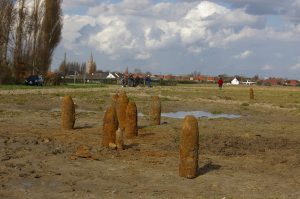In late 2020, students taking part in the “Politics of Memory and Oblivion” course, a part of the Cultural Heritage Masters programme, created blog posts and podcasts on the subject of difficult heritage. The online course was open to domestic and exchange students at the University of Helsinki, and additionally open to students in the UNA Europa network of universities. In the coming weeks we showcase some of their work.
The following podcast and introduction are by Alina Tibilova, Anna Heikkilä and Minna Taikina-aho (all University of Helsinki) and Hanna Martynenko (Jagiellonian University in Krakow).
We made a podcast about the memorial of the Beslan school attack in 2004. Here we’re discussing the 2020 state of the gym building ruins from the perspectives of ‘dark’ heritage and embodied collective trauma. It was important for us to raise this theme because today’s condition is quite controversial. We will be grateful if you listen to the podcast, but be prepared for the fact that listening and talking about this topic is always very emotionally difficult.

